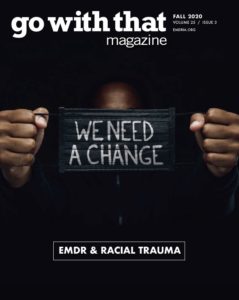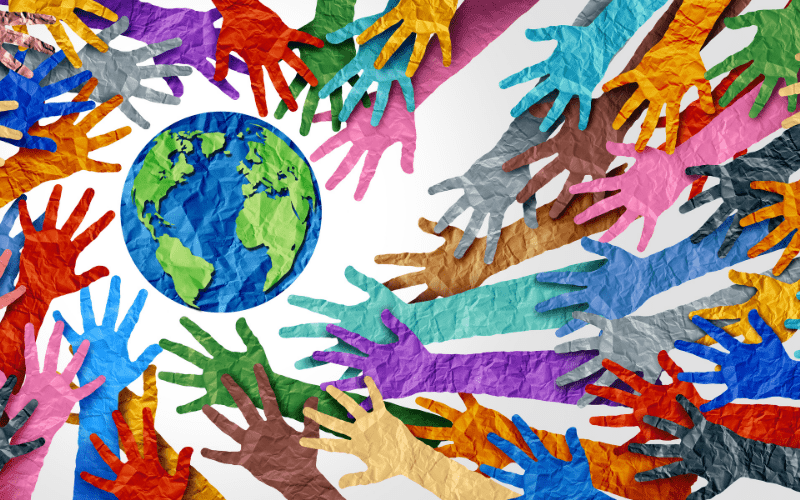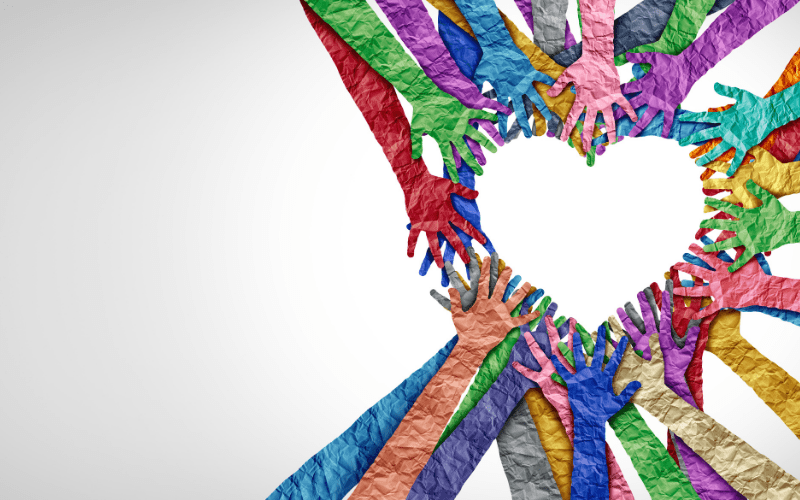EMDR and Racial Trauma Go With That Magazine Issue
We invited several authors to write about “EMDR and Racial Trauma” in the Fall 2020 Go With That Magazine issue. We are sharing Dr. Wendy Ashley and Dr. Allen Lipscomb article here.
 Addressing Racialized Trauma Utilizing EMDR and Antiracist Psychotherapy
Addressing Racialized Trauma Utilizing EMDR and Antiracist Psychotherapy
By Dr. Wendy Ashley and Dr. Allen Lipscomb
Excerpt:
“…Lived experiences of managing microaggressions, racist interactions, systemic oppression, and graphic media coverage of police lynchings is perceived by many Black and Indigenous People of Color (BIPOC) as racial trauma. Racial trauma is defined as events of danger related to real or perceived experiences of racial discrimination, which include threats of harm or injury, humiliating or shaming events and witnessing harm to other people of color (Bor, et al, 2018; Carter, 2007; Comas-Diaz, Hall & Neville, 2019). Racial minorities may be more negatively impacted by trauma due to repeated exposure from ongoing individual, interpersonal, institutional, and systemic racism that has transpired throughout history. Eye Movement Desensitization and Reprocessing (EMDR) is an effective trauma treatment approach. However, despite EMDR’s efficacy, there are minimal references to diversity, culture, or intersectionality in EMDR training or research. Without protocol adaptations for African American clients, there is an expectation of an antiquated, one size fits all orientation. Culturally relevant treatment with this population includes consideration of the lived experiences and context of Black Americans, acknowledgment of historical trauma and reluctance, stigma and shame regarding help seeking and treatment. Failure to include these racialized concepts obscures the relevance of identity, power, privilege, and inclusion in mental health treatment. In 2020, this is no longer an option if we intend to be effective with clients of color….”
“Five recommendations for clinicians
1. Clinicians should actively determine whether they wish to be antiracist in their clinical approach with clients. Those who identify as non-racist must take into consideration that the passivity that comes with that designation externally appears like collusion with the systems of oppression that maintain racist policies, practices, and structures.
2. Trust is not automatic. There are hundreds of years of reasons why Black clients are distrustful of treatment providers. Clinicians must be curious about how their clients self-identify, encourage clients to share their intersectional identities, and talk in therapy about the differences between themselves and clients. Failure to discuss differences in social location can significantly derail the development of a therapeutic rapport.
3. The experience of racism (whether direct or indirect) has a profound impact on Black individuals in a deeply significant and wounding way. Frequently, the more intersectional factors of marginalization create additional factors for nuanced wounding. However, clinicians who may not have the same intersectional identity factors may miss the magnitude of the racialized traumatic experience(s). As a result, careful assessment of both traumas and racial traumas are critical.
4. The clinician must be consistent in how they are showing up as an antiracist therapist. This must be done throughout the course of EMDR treatment (regardless of protocol phase) and can manifest through race related inquiry, culturally relevant cognitive interweaves, or awareness that successful desensitization may involve a higher subjective units of distress (SUDS) level due to ongoing threats related to racism.
5. Therapists must maintain awareness of their reactions to race related content. Managing default response behaviors (specifically, this refers to an internal awareness of where clinicians typically go when race related content is presented and explored) is of the utmost clinical importance. Where clinicians default when uncomfortable halts critical reprocessing content, and ultimately, successful desensitization and reprocessing.”
Click here to download Dr. Ashley and Dr. Lipscomb’s article
This issue also includes the following articles:
- Racial Trauma, Neurons, and EMDR: The Path Towards Antiracist Psychotherapy by David Archer, MSW, MFT
- Addressing Racialized Trauma Utilizing Emdr and Antiracist Psychotherapy Practices by Wendy Ashley, PSY.D, LCSW & Allen Lipscomb, PSY.D, LCSW
- Spacehogs Make a Difference by Cío Hernández, PH.D., LMFT, LPCC
- Engage In The Conversation of Race and Racism with “Hot Chocolate and Cheese:” an Idea you can Implement by Viviana Urdaneta
Resources
Anxiety & Depression Association of America. Black and African American Communities. https://adaa.org/find-help/by-demographics/black-african-american-communities
Archer, D. (2021). Anti-Racist Psychotherapy: Confronting Systemic Racism and Healing Racial Trauma. Montreal, QC: Each One Teach One Publications.
Clearly Clinical. (2022). Lifting Black Voices: Therapy, Trust, and Racial Trauma (Ep. 95). Podcast featuring La Shanda Sugg, LPC, Dr. Tiffany Crayton, LPC-S, and LJ Lumpkin, LMFT. https://courses.clearlyclinical.com/courses/free-ceu-racial-trauma-therapy
EMDRIA. (n.d.). Antiracism Resources. www.emdria.org/publications-resources/practice-resources/antiracism-resources/
Levis, R. V. (2017). Placing Culture at the Heart of EMDR Therapy. In Nickerson, M. I. (Ed.), Cultural Competence and Healing Culturally-Based Trauma with EMDR Therapy: Innovative Strategies and Protocols (pp. 97-112). New York, NY: Springer Publishing Co.
Levis, R. V., & Siniego, L. B. (2017). An Integrative Framework for EMDR Therapy as an Anti-Oppression Endeavor. In Nickerson, M. I. (Ed.), Cultural Competence and Healing Culturally Based Trauma with EMDR Therapy: Innovative Strategies and Protocols (pp. 79-96). New York, NY: Springer Publishing Co.
McGrew, T. (2018). The history of residential segregation in the United States, Title VIII, and the homeownership remedy. The American Journal of Economics and Sociology, 77(3-4), 1013-1048. https://doi.org/10.1111/ajes.12243
Mental Health Alliance. Black and African American Communities and Mental Health. www.mhanational.org/issues/black-and-african-american-communities-and-mental-health
National Alliance on Mental Illness (NAMI). Your Journey: Black/African American. www.nami.org/Your-Journey/Identity-and-Cultural-Dimensions/Black-African-American
Nickerson, M. I. (2017). Cultural Competence and Healing Culturally Based Trauma with EMDR Therapy: Innovative Strategies and Protocols. New York, NY: Springer Publishing Co.
Orelus, P. W. (2012). Being black and brown in the 21st century: Challenges and pedagogical possibilities. Sage Open 2(4), Open access: https://doi.org/10.1177%2F2158244012464979
Smith, L., Proctor, G., & Akondo, D. (2021). Confronting racism in counselling and therapy training – Three experiences of a seminar on racism and whiteness. Psychotherapy and Politics International, 19(2), e1579. Open access: https://doi.org/10.1002/ppi.1579
TED. (2021). Miracle Jones: The Radical, Revolutionary Resilience of Black Joy. YouTube. www.youtube.com/watch?v=PveqmDnqZw4
Washington, J. T. (2020). Examining the historical and present-age impact of racism in the United States of American through the arts, aesthetic education, and transformative learning theory: Empowering social work students to effectively discuss racism and provide best practices with African Americans and other people of color (Publication No. 139) [Doctoral dissertation, University of Pennsylvania, School of Social Work]. https://repository.upenn.edu/edissertations_sp2/139/
EMDRIA Race, Culture, and Ethnicity OnDemand Education Opportunities
Archer, D. (2020). Racial Trauma, Neurons, and EMDR: The Path Towards an Anti-Racist Psychotherapy. [EMDRIA Conference session]. EMDRIA OnDemand. www.emdria.org/course/racial-trauma-neurons-and-emdr-the-path-towards-an-anti-racist-psychotherapy/
Archer, D., Ashley, W., Chaffers, Q., & Hernandez, R. (2020). The Elephant in the Room: Systemic Racism and Psychotherapy. [EMDRIA Conference session, panel discussion]. EMDRIA OnDemand. www.emdria.org/course/the-elephant-in-the-room-systemic-racism-and-psychotherapy/
Ashley, W., & Lipscomb, A. (2020). EMDR Therapy with an Afrocentric Critical Race Perspective. [EMDRIA Conference session]. EMDRIA OnDemand. www.emdria.org/course/emdr-therapy-with-an-afrocentric-critical-race-perspective/
Chaffers, Q., & Brown, K. (2020). Healing the Healer: EMDR-IGTP-OTS & Vicarious Trauma in Black Clinicians. [EMDRIA Conference session]. EMDRIA OnDemand. www.emdria.org/course/healing-the-healer-emdr-igtp-ots-vicarious-trauma-in-black-clinicians/
Hernandez, R. (2020). EMDR Diversity & The Spectrum of Trauma Prevention. [EMDRIA Conference session]. EMDRIA OnDemand. www.emdria.org/course/emdr-diversity-the-spectrum-of-trauma-prevention/
Nickerson, M. (2020). Social Trauma and Adversity: Restoring Connectedness and Resilience. EMDRIA OnDemand. www.emdria.org/course/social-trauma-and-adversity-restoring-connectedness-and-resilience/
Back to Focal Point Blog Homepage
Additional Resources
If you are a therapist interested in the EMDR training:
- Learn more about EMDR at the EMDRIA Library
- Learn more about EMDR Training
- Search for an EMDR Training Provider
- Check out our EMDR Training FAQ
If you are EMDR trained:
- Check out EMDRIA’s Let’s Talk EMDR Podcast
- Check out the EMDRIA Focal Point Blog
- Learn more about EMDRIA membership
- Search for Continuing Education opportunities
If you are an EMDRIA Member:
Date
February 5, 2021
Topics
Racial Trauma
Client Population
Racial/Cultural/Ethnic Groups
Practice & Methods
DEI/IDEA





